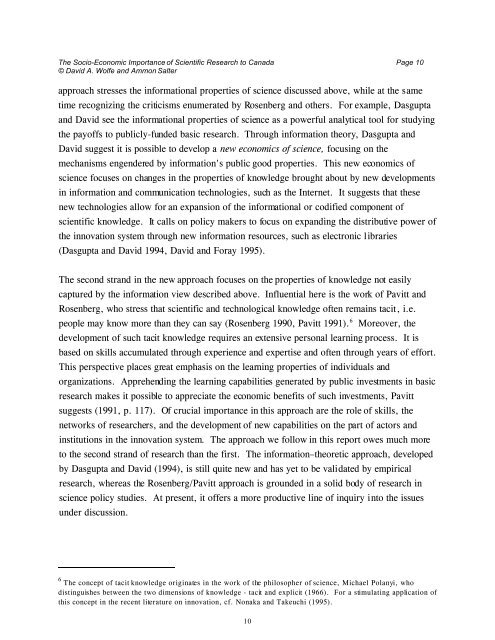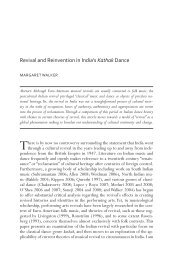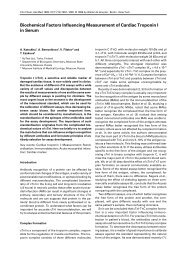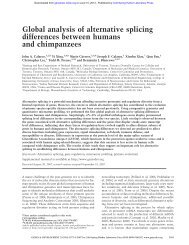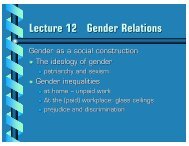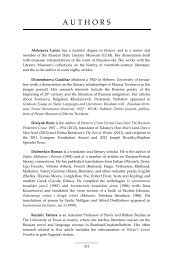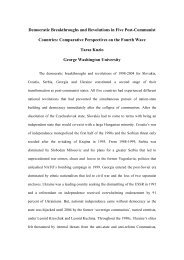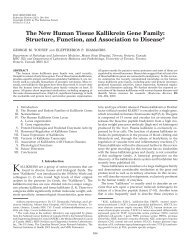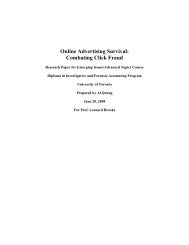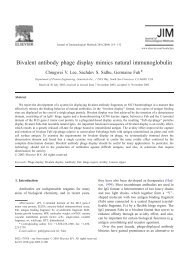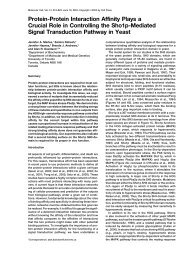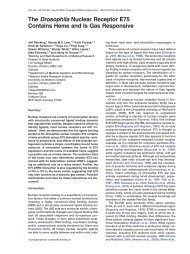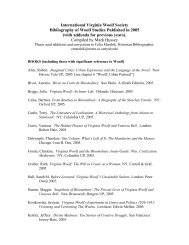The Socio-Economic Importance of Scientific Research To Canada
The Socio-Economic Importance of Scientific Research To Canada
The Socio-Economic Importance of Scientific Research To Canada
Create successful ePaper yourself
Turn your PDF publications into a flip-book with our unique Google optimized e-Paper software.
<strong>The</strong> <strong>Socio</strong>-<strong>Economic</strong> <strong>Importance</strong> <strong>of</strong> <strong>Scientific</strong> <strong>Research</strong> to <strong>Canada</strong> Page 10© David A. Wolfe and Ammon Salterapproach stresses the informational properties <strong>of</strong> science discussed above, while at the sametime recognizing the criticisms enumerated by Rosenberg and others. For example, Dasguptaand David see the informational properties <strong>of</strong> science as a powerful analytical tool for studyingthe pay<strong>of</strong>fs to publicly-funded basic research. Through information theory, Dasgupta andDavid suggest it is possible to develop a new economics <strong>of</strong> science, focusing on themechanisms engendered by information's public good properties. This new economics <strong>of</strong>science focuses on changes in the properties <strong>of</strong> knowledge brought about by new developmentsin information and communication technologies, such as the Internet. It suggests that thesenew technologies allow for an expansion <strong>of</strong> the informational or codified component <strong>of</strong>scientific knowledge. It calls on policy makers to focus on expanding the distributive power <strong>of</strong>the innovation system through new information resources, such as electronic libraries(Dasgupta and David 1994, David and Foray 1995).<strong>The</strong> second strand in the new approach focuses on the properties <strong>of</strong> knowledge not easilycaptured by the information view described above. Influential here is the work <strong>of</strong> Pavitt andRosenberg, who stress that scientific and technological knowledge <strong>of</strong>ten remains tacit, i.e.people may know more than they can say (Rosenberg 1990, Pavitt 1991). 6 Moreover, thedevelopment <strong>of</strong> such tacit knowledge requires an extensive personal learning process. It isbased on skills accumulated through experience and expertise and <strong>of</strong>ten through years <strong>of</strong> effort.This perspective places great emphasis on the learning properties <strong>of</strong> individuals andorganizations. Apprehending the learning capabilities generated by public investments in basicresearch makes it possible to appreciate the economic benefits <strong>of</strong> such investments, Pavittsuggests (1991, p. 117). Of crucial importance in this approach are the role <strong>of</strong> skills, thenetworks <strong>of</strong> researchers, and the development <strong>of</strong> new capabilities on the part <strong>of</strong> actors andinstitutions in the innovation system. <strong>The</strong> approach we follow in this report owes much moreto the second strand <strong>of</strong> research than the first. <strong>The</strong> information–theoretic approach, developedby Dasgupta and David (1994), is still quite new and has yet to be validated by empiricalresearch, whereas the Rosenberg/Pavitt approach is grounded in a solid body <strong>of</strong> research inscience policy studies. At present, it <strong>of</strong>fers a more productive line <strong>of</strong> inquiry into the issuesunder discussion.6 <strong>The</strong> concept <strong>of</strong> tacit knowledge originates in the work <strong>of</strong> the philosopher <strong>of</strong> science, Michael Polanyi, whodistinguishes between the two dimensions <strong>of</strong> knowledge - tacit and explicit (1966). For a stimulating application <strong>of</strong>this concept in the recent literature on innovation, cf. Nonaka and Takeuchi (1995).10


